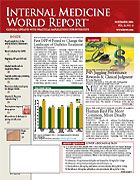Publication
Article
Internal Medicine World Report
Inhaled Insulin Maintains Efficacy, Safety During a Cold, Flu
Author(s):
From the European Association for the Study of Diabetes Less Weight Gain than with Injected Insulin
COPENHAGEN?Inhaled human insulin (Exubera) safely maintains good blood sugar control in patients with diabetes, even if they develop a respiratory infection or are exposed to secondhand smoke. It is also associated with less weight gain than the injected form, investigators said at the 42nd European Association for the Study of Diabetes.
Results from an open-label, randomized, crossover study that included 50 healthy, nonsmoking participants (22 men, 27 women; mean age, 34.3 years) showed that while secondhand smoke could decrease the absorption of inhaled insulin, it was still effective in patients exposed to a smoky environment. Participants received a single dose of inhaled insulin (3 mg) without being exposed to secondhand smoke or after 2 hours of (simulated) secondhand smoke exposure. There was a ≥2- week washout period between study phases. A total of 27 participants completed both phases.
The mean plasma insulin area under the curve decreased from 5703 μU/ min/mL with inhaled human insulin alone to 4718 μU/min/mL after exposure to secondhand smoke. Mean maximum concentration also decreased, from 41.0 μU/mL with inhaled human insulin alone to 28.9 μU/mL after secondhand smoke exposure.
In addition, a retrospective analysis of 14 phase 2 and phase 3 clinical studies on inhaled insulin that lasted from 3 to 24 months found that the agent was effective and well tolerated in adults with type 1 and type 2 diabetes who developed a respiratory illness.
About 2500 patients (aged 18-65 years) were included in the analysis: 918 with type 1 and 1578 with type 2 diabetes. Intercurrent respiratory tract infections were found to be common, regardless of treatment (ie, inhaled insulin, subcutaneous insulin, oral agents), but ≤5% of events led to permanent discontinuation of inhaled insulin. No apparent changes in glycosylated hemoglobin levels or overall hypoglycemic events were observed in patients with intercurrent respiratory tract infections in any of the 3 treatment groups.
"This information is important for physicians who have prescribed or are considering prescribing Exubera to their patients," said Philippe Camus, MD, of the University Medical Center, Dijon, France, and lead investigator of the retrospective analysis. "It shows that the efficacy and tolerability of Exubera remain unchanged even if patients develop a cold or the flu. Also, studies showed patients taking Exubera are no more likely to develop a respiratory infection than patients using injectable insulin."
Another report indicated that the availability of inhaled insulin encourages twice as many patients to try insulin therapy. Analysis of previously reported data on 288 men and women aged ≥60 years with uncontrolled type 2 diabetes showed that 44% would opt for insulin therapy if it could be inhaled, while only 17% would try insulin if there was no inhaled formulation. This held true even in countries where insulin pens are commonly used.
"This finding contradicts the perception that insulin pens can overcome peoples' resistance to using insulin," said lead investigator Nick Freemantle, PhD, professor of clinical epidemiology and biostatistics, University of Birmingham, United Kingdom. "This is incredibly important in helping people to reduce their chances of suffering from the serious complications of uncontrolled diabetes, such as blindness and amputations, as well as for the healthcare systems responsible for reducing diabetes-related morbidity and mortality."
Finally, an analysis of 5 open-label, controlled, phase 3 clinical trials involving a total of 1960 patients showed that patients with type 1 or 2 diabetes (n = 987) who used inhaled insulin gained less weight than those using injectable insulin (n = 973). Patients with type 2 diabetes gained less than half the weight of those who were using injectable insulin (0.7 vs 1.6 kg); the difference was even greater for patients with type 1 diabetes (0.2 vs 1.1 kg).
"Many of my patients worry about weight gain with insulin," said lead investigator Priscilla Hollander, MD, PhD, of Baylor University Medical Center, Dallas. "This may be another reason for physicians and their patients to consider Exubera to control blood sugar levels."
Inhaled insulin should not be used by patients who smoke or have smoked in the past 6 months, or by patients who have underlying lung diseases, such as asthma or chronic obstructive pulmonary disease.





